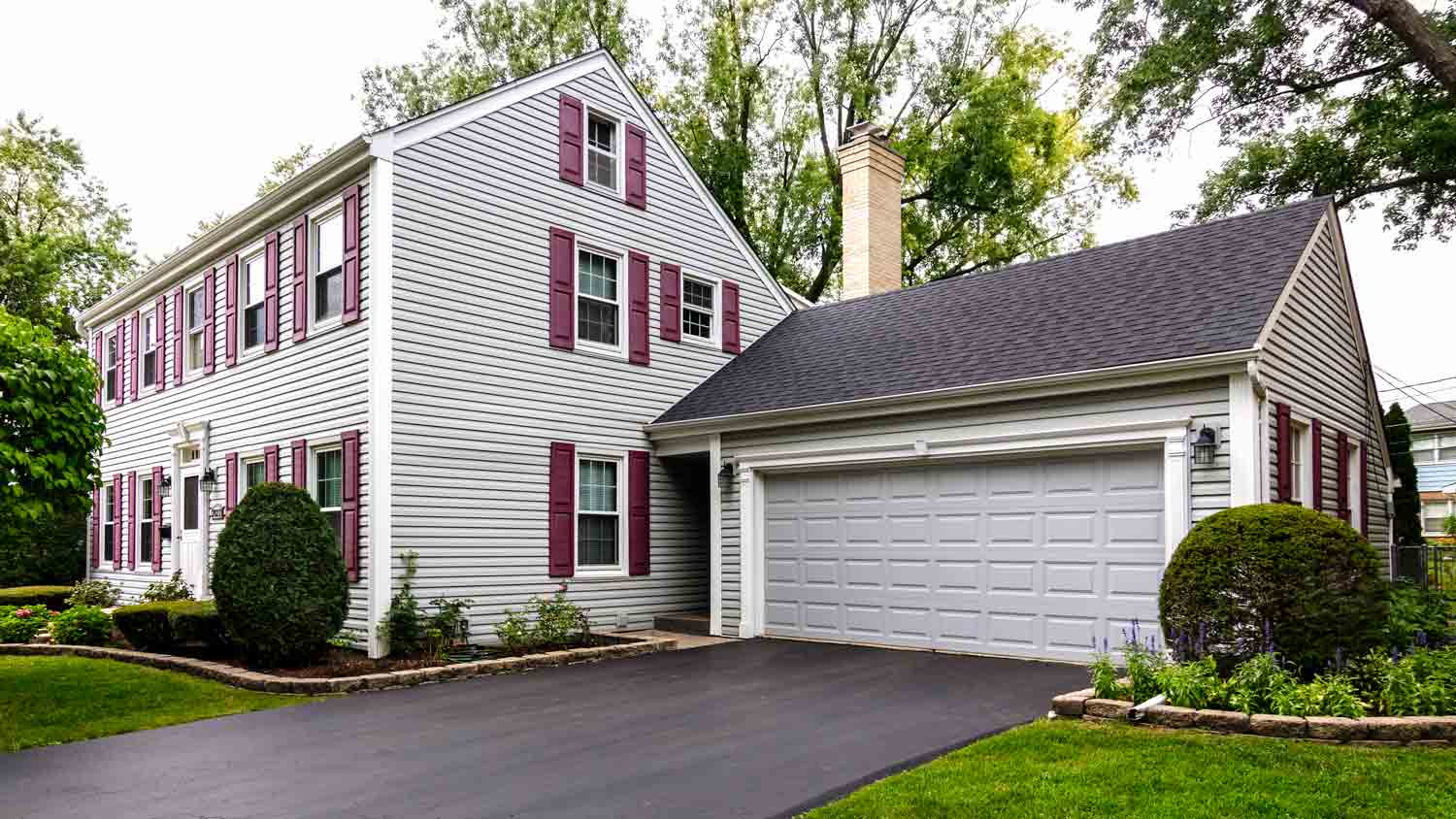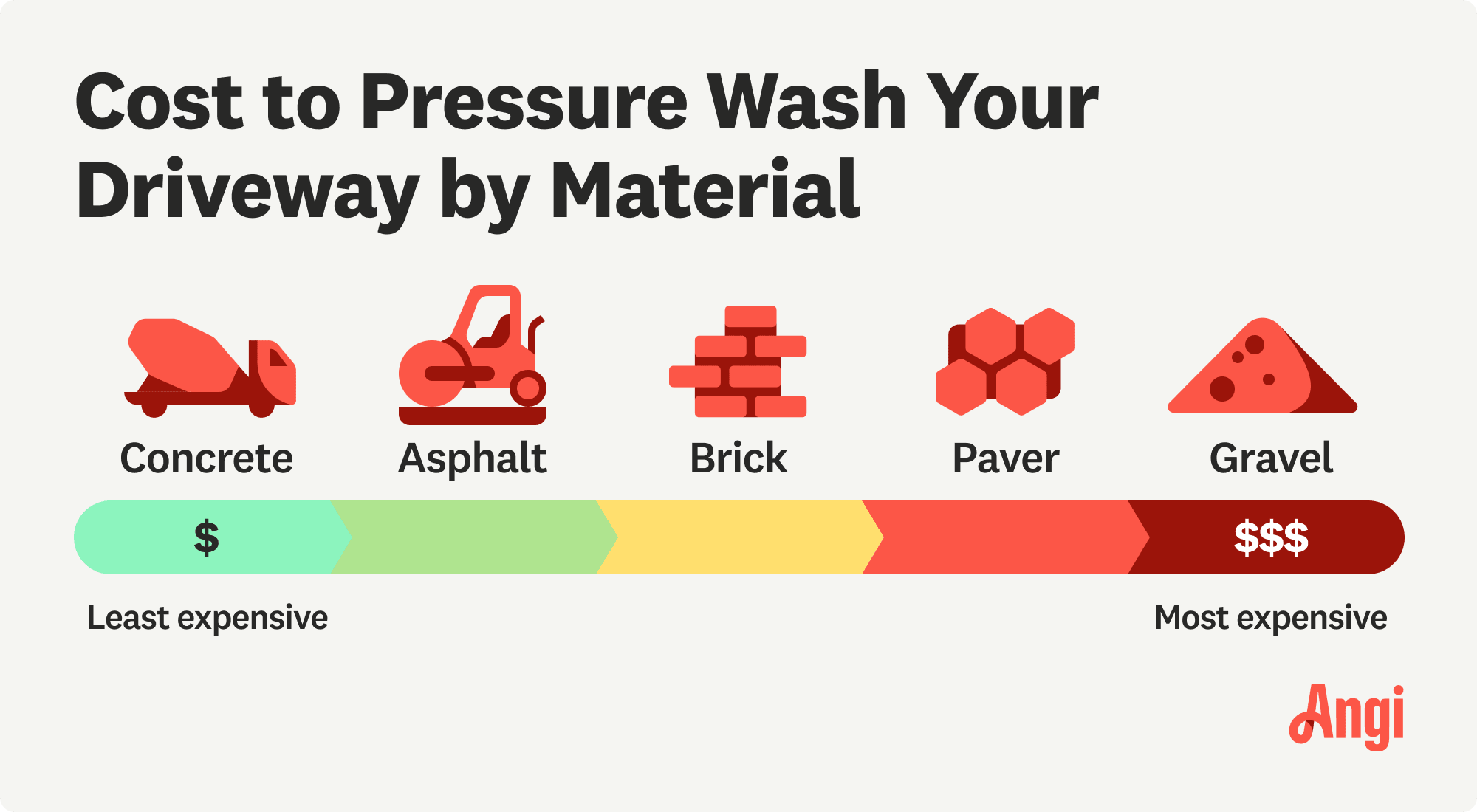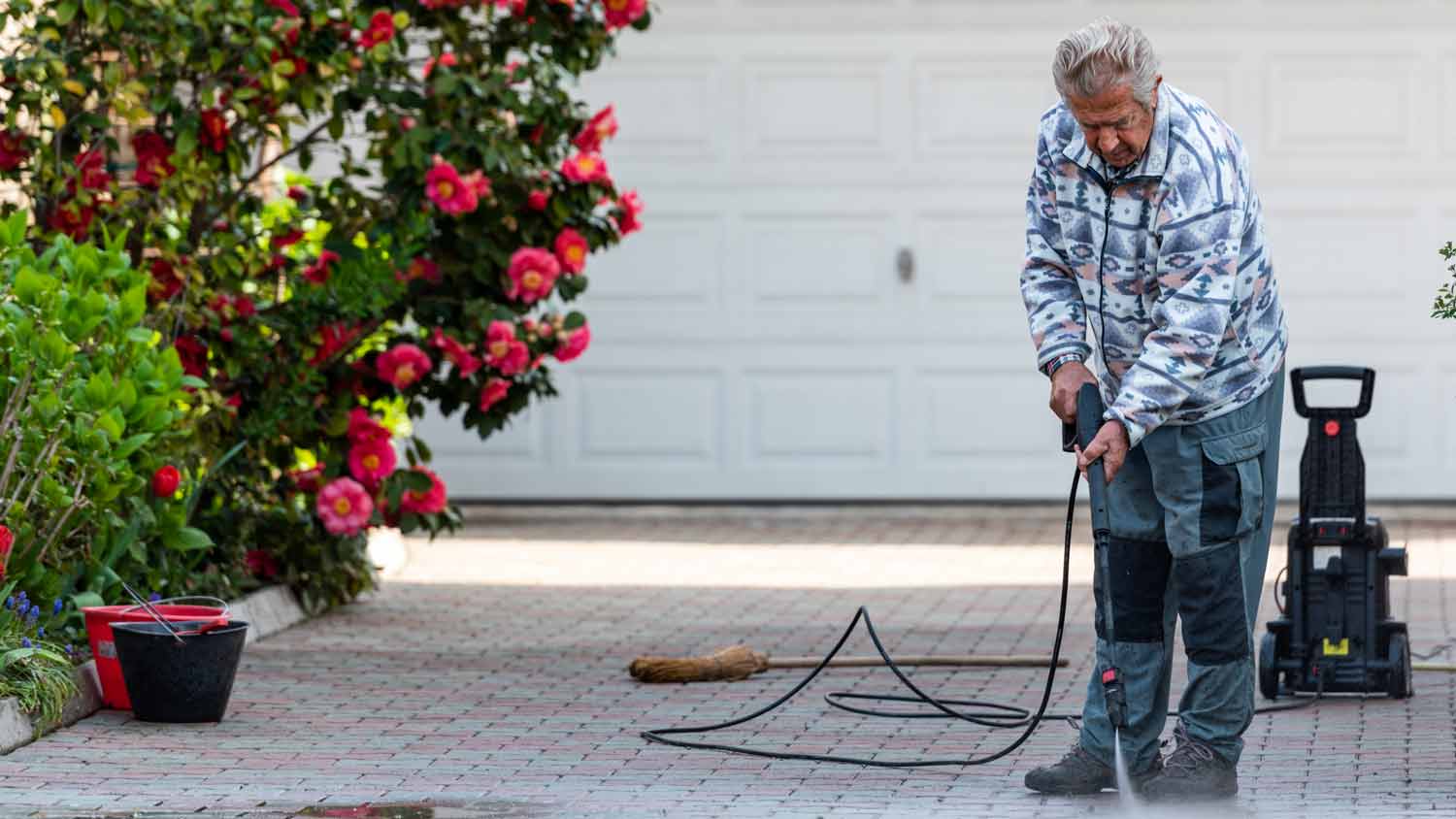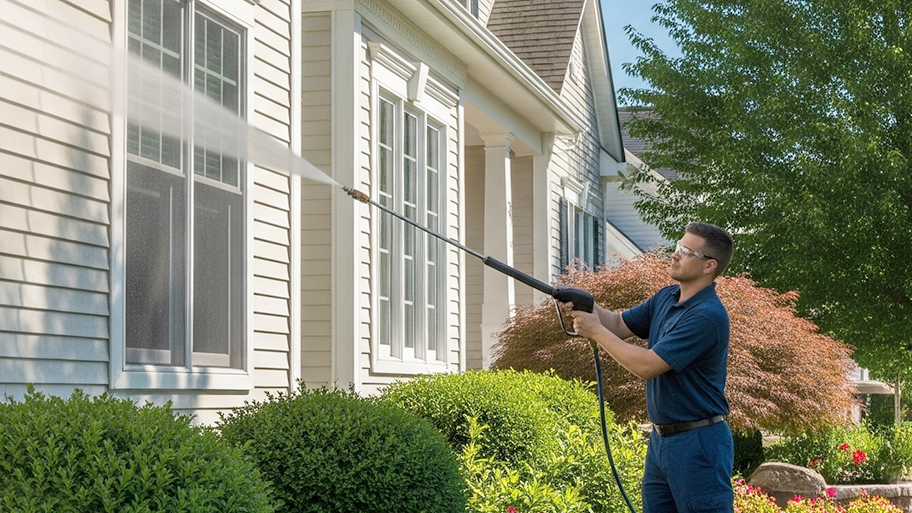
Pressure washers can help you keep your home looking great. Use this guide to learn how much it costs to rent a pressure washer based on factors like type and time.
Expect to spend between $100 and $500 to pressure wash a driveway, depending on the size. Some materials, such as pavers and gravel, are more delicate and might be more expensive to wash.


Driveway size is the most significant cost factor, with professionals often charging between $0.30 and $0.55 per square foot.
Pressure washing enhances curb appeal and creates a safer walking surface.
Concrete driveways are generally the least expensive to pressure wash, while gravel driveways tend to be the most expensive.
The cost to pressure wash a driveway ranges from $100 to $500, but most people pay around $210. Factors like your driveway's size and type can impact how much you'll pay for this project. Concrete driveways typically cost less to pressure wash, while gravel driveways are the most expensive. You can expect to spend between $0.30 to $0.55 per square foot on driveway pressure washing costs.
Pressure washing your driveway removes moss and mold, making it a safer surface to walk on. And let’s be honest—giving your driveway a deep clean just makes it look nicer for curb appeal purposes. Learn all about how much it costs to pressure wash a driveway so you can budget accordingly and keep weeds at bay.
Be prepared to discuss your home size, number of floors, and home layout with your pro.
Mention what materials you have on or around your home that you want pressure washed.
Ask your pro if they use cleaners and ensure they’re safe for use around plants and pets, if applicable.
Discuss any add-on services you want, like soft washing for your roof, concrete sealing, or gutter cleaning.
Several factors influence the cost of pressure washing a driveway. The size of your driveway is the most significant, as most professionals charge by the square foot. The material of your driveway also plays a role, with porous or uneven surfaces like gravel and pavers often costing more than smooth concrete or asphalt. Additionally, the condition of your driveway, including the presence of stubborn stains or heavy buildup, can affect the price due to the extra time and cleaning solutions required. Ultimately, getting a quote from a local pressure washing pro will be the best way to know what factors will impact your specific project.
If you hire a local pressure washing company to clean your driveway, you can expect to pay between $0.30 and $0.55 per square foot. Occasionally, pros will charge by the hour, ranging from $60 to $125 per hour for labor costs. The job only takes one to two hours to complete, but it can take longer if your driveway is very large or in poor condition.
Since most pressure washing companies charge by square foot instead of by hour, you might face an additional minimum charge for your project. This is typically for smaller projects (think one-car driveways) to help cover the company’s cost of travel, overhead, and other operating expenses. If you’re unsure if your project will be charged a standard rate or will have a minimum fee added to the project cost, speak with your local pressure washing company.
The cost to pressure wash a driveway ranges from $175 to $320 for an average 576-square-foot driveway, plus labor. Your driveway's size is the most significant cost factor. In fact, many pros use square footage to charge for pressure washing. The bigger your driveway, the more you can expect to pay to pressure wash it.
Here’s a breakdown of pressure washing costs by the size of your driveway:
| Square Footage of Driveway | Average Cost |
|---|---|
| 200 | $60–$110 |
| 300 | $90–$165 |
| 400 | $120–$220 |
| 576* | $175–$320 |
| 600 | $180–$330 |
| 800 | $240–$440 |
| 1,000 | $300-$550 |
| 1,200 | $360–$660 |
*Most common driveway size

It costs the most to pressure wash gravel and paver driveways, while concrete and asphalt, thanks to their smooth surfaces, cost the least. Brick driveways fall right in the middle of the cost spectrum.
| Driveway Material | Average Cost (600 Sq. Ft. Driveway) | Additional Details |
|---|---|---|
| Concrete | $120–$190 | The porous nature of concrete often requires a concrete-safe cleaning solution and a high setting on the pressure washer to adequately loosen up all the dirt and debris within it. |
| Asphalt | $125–$195 | A high setting on the pressure washer can damage asphalt, so it needs to be done on a lower setting. You’ll need to apply cleaning solutions before pressure washing to break up stains and dirt. |
| Brick | $130–$200 | Brick can take a high-pressure setting for a cleaning, but the mortar that holds it together is a magnet for dirt and grime, so it often takes longer to pressure wash than asphalt and concrete. |
| Paver | $135–$210 | More expensive than other types since pavers often form intricate patterns and designs, with lots of cracks that the water needs to work through. |
| Gravel | $135–$210 | Requires some finesse to clean since the pressure washer can potentially displace the gravel. You’ll need to pressure wash it from relatively far away on a high setting or relatively close on a low setting. |
How often you should pressure wash your driveway really depends on your preferences. Factors like the amount of use your driveway gets and the level of dirt present in the surrounding environment play a significant role in how quickly it gets dirty again. Most pressure washing jobs wear off after a few months to a year, so you might consider pressure washing twice per year to keep your driveway looking great all year long. While you’re at it, you can also pressure wash your gutters and brick veneer siding.
Generally, the spring or summer months are best to tackle this project, since the weather is typically warmer and drier, allowing the driveway to dry more quickly after cleaning. This is important, especially if you plan to seal it afterward. Also, since surfaces aren't covered in snow and ice, the initial cleaning process is much easier than battling with leftover winter sludge. Always consult with a pressure washing pro near you on what the best cleaning schedule is for your driveway.
In many cases, pressure washing is just the beginning step in your home beautification process. Other projects, like driveway repair or repaving, should be done after pressure washing to ensure a clean surface for the new work and avoid immediately dirtying a freshly cleaned area. Or, pair your driveway pressure washing project with other cleaning projects to maximize efficiency.
Driveway sealing cost: $280–$860
Asphalt driveway repair cost: $1,100–$4,100
Concrete driveway repair cost: $830–$2,900
Driveway repaving cost: $1,400–$12,100
Cost to pressure wash house: $220–$450
Cost to power wash a patio: $100–$400
Cost to pressure wash a fence: $100–$350

If you hire a pressure washing pro near you, they’ll be able to safely and efficiently clean up your driveway. It’ll cost about $0.30 to $0.55 per square foot for labor, but DIYing this project won’t save much if you have to rent a pressure washer.
Though many homeowners take on pressure washing themselves, there are a few reasons you should hire a pro:
Accidents can happen, and DIY pressure washing can cause injury or property damage.
You won’t save a lot by renting a pressure washer and doing the job yourself.
Pros know how to treat different types of surfaces to avoid damage.
This job is quite labor-intensive, but an expert can do it efficiently.
Pros carry insurance and have the tools to handle the job.
You’ll spend more to repair damage from DIY pressure washing than if you had hired a pro in the first place.
Before power washing your driveway, be sure to:
Wear protective gear, including a face shield or goggles and steel-toed work boots.
Carefully read the manual and manufacturer’s instructions.
Inspect the equipment to make sure the hoses and cords aren’t damaged.
Turn off the power to outdoor electrical outlets and clear the area.
Alert your family of where you are pressure washing so they can avoid the area.
Keep an eye out for people, pets, plants, potential electrical hazards, fragile materials, or objects that could potentially break, and don’t point pressure washer at them.
If you want to spruce up your driveway without breaking the bank too much, there are several ways to potentially save money on pressure washing a driveway, including:
Getting quotes from multiple pros to find the best price
Pressure washing the driveway yourself, particularly if you have a large driveway
Making your own cleaning solvents with household ingredients, like vinegar and baking soda
Performing regular maintenance to minimize the need for extensive cleaning
Bundling several pressure washing services together for a potential bulk discount
Be prepared to discuss the approximate size of your driveway and the materials.
If you have space in your budget, ask about pressure washing other surfaces at the same time (like siding or a deck).
Talk about a timeline with your pressure washing pro so you know when and for how long your driveway will be unavailable.
Home is the most important place on earth, which is why Angi has helped more than 150 million homeowners transform their houses into homes they adore. To help homeowners with their next project, Angi provides readers with the most accurate cost data and upholds strict editorial standards. We extensively research project costs to develop the pricing data you see, so you can make the best decisions for you and your home. We rely on reputable sources, including the U.S. Bureau of Labor Statistics, academic journals, market studies, and interviews with industry experts—all to ensure our prices reflect real-world projects.
Want to help us improve our cost data? Send us a recent project quote to [email protected]. Quotes and personal information will not be shared publicly.
From average costs to expert advice, get all the answers you need to get your job done.

Pressure washers can help you keep your home looking great. Use this guide to learn how much it costs to rent a pressure washer based on factors like type and time.

The cost to pressure wash a deck depends on its size, condition, material, and whether you DIY the job. Help set your budget with this cost guide.

Need to breathe new life into your dirty siding and trim? Explore the cost to pressure wash a house to boost your curb appeal instantly.

To keep your pressure washing running whenever you need it, make sure to follow this pressure washer maintenance checklist.

In many cases, pressure washing before painting is helpful, but it’s not always appropriate. Use this guide to learn whether to power wash your house before painting.

Should you pressure wash siding? While perfect for hardscaping elements like brick patios, pressure washing can damage siding if not done properly. Before you have dirt blasted from your siding, learn if pressure washing is right for your home.